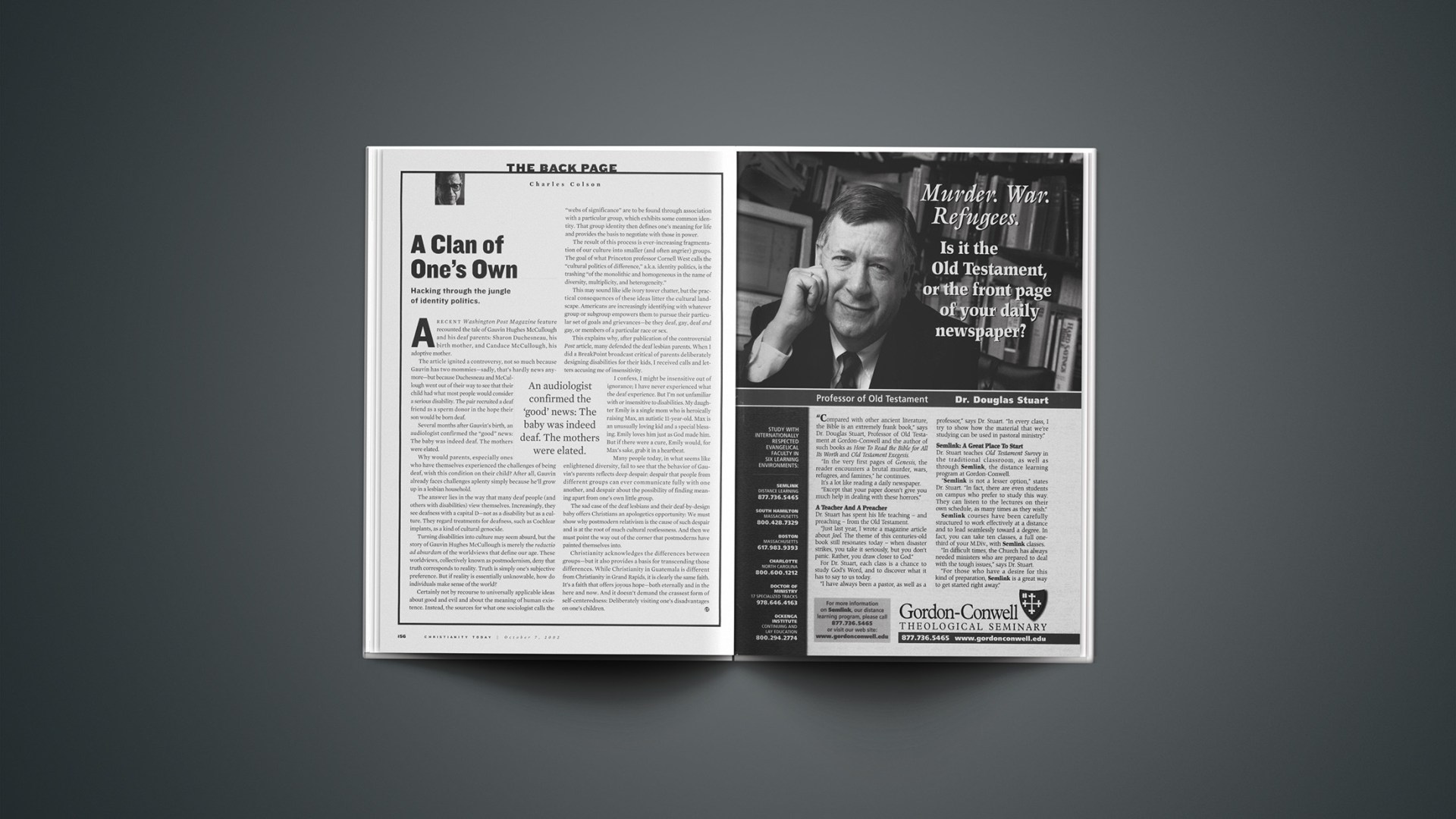A recent Washington Post Magazine feature recounted the tale of Gauvin Hughes McCullough and his deaf parents: Sharon Duchesneau, his birth mother, and Candace McCullough, his adoptive mother.
The article ignited a controversy, not so much because Gauvin has two mommies—sadly, that’s hardly news anymore—but because Duchesneau and McCullough went out of their way to see that their child had what most people would consider a serious disability. The pair recruited a deaf friend as a sperm donor in the hope their son would be born deaf.
Several months after Gauvin’s birth, an audiologist confirmed the “good” news: The baby was indeed deaf. The mothers were elated.
Why would parents, especially ones who have themselves experienced the challenges of being deaf, wish this condition on their child? After all, Gauvin already faces challenges aplenty simply because he’ll grow up in a lesbian household.
The answer lies in the way that many deaf people (and others with disabilities) view themselves. Increasingly, they see deafness with a capital D—not as a disability but as a culture. They regard treatments for deafness, such as Cochlear implants, as a kind of cultural genocide.
Turning disabilities into culture may seem absurd, but the story of Gauvin Hughes McCullough is merely the reductio ad absurdum of the worldviews that define our age. These worldviews, collectively known as postmodernism, deny that truth corresponds to reality. Truth is simply one’s subjective preference. But if reality is essentially unknowable, how do individuals make sense of the world?
Certainly not by recourse to universally applicable ideas about good and evil and about the meaning of human existence. Instead, the sources for what one sociologist calls the “webs of significance” are to be found through association with a particular group, which exhibits some common identity. That group identity then defines one’s meaning for life and provides the basis to negotiate with those in power.
The result of this process is ever-increasing fragmentation of our culture into smaller (and often angrier) groups. The goal of what Princeton professor Cornell West calls the “cultural politics of difference,” a.k.a. identity politics, is the trashing “of the monolithic and homogeneous in the name of diversity, multiplicity, and heterogeneity.”
This may sound like idle ivory tower chatter, but the practical consequences of these ideas litter the cultural landscape. Americans are increasingly identifying with whatever group or subgroup empowers them to pursue their particular set of goals and grievances—be they deaf, gay, deaf and gay, or members of a particular race or sex.
This explains why, after publication of the controversial Post article, many defended the deaf lesbian parents. When I did a BreakPoint broadcast critical of parents deliberately designing disabilities for their kids, I received calls and letters accusing me of insensitivity.
I confess, I might be insensitive out of ignorance; I have never experienced what the deaf experience. But I’m not unfamiliar with or insensitive to disabilities. My daughter Emily is a single mom who is heroically raising Max, an autistic 11-year-old. Max is an unusually loving kid and a special blessing. Emily loves him just as God made him. But if there were a cure, Emily would, for Max’s sake, grab it in a heartbeat.
Many people today, in what seems like enlightened diversity, fail to see that the behavior of Gauvin’s parents reflects deep despair: despair that people from different groups can ever communicate fully with one another, and despair about the possibility of finding meaning apart from one’s own little group.
The sad case of the deaf lesbians and their deaf-by-design baby offers Christians an apologetics opportunity: We must show why postmodern relativism is the cause of such despair and is at the root of much cultural restlessness. And then we must point the way out of the corner that postmoderns have painted themselves into.
Christianity acknowledges the differences between groups—but it also provides a basis for transcending those differences. While Christianity in Guatemala is different from Christianity in Grand Rapids, it is clearly the same faith. It’s a faith that offers joyous hope—both eternally and in the here and now. And it doesn’t demand the crassest form of self-centeredness: Deliberately visiting one’s disadvantages on one’s children.
Related Elsewhere
Also appearing on our site today:
Making ColumnsA behind-the-scenes look at Charles Colson’s writing.
See the Washington Post article, “A World of Their OwnIn the eyes of his parents, if Gauvin Hughes McCullough turns out to be deaf, that will be just perfect.”
Additional commentary on the Gauvin Hughes McCullough situation includes:
Victims from birth—Wendy McElroy, FoxNews
Recent Charles Colson columns for Christianity Today include:
The Wages of SecularismNew laws won’t prevent another Enron. (June 4, 2002)
More Doctrine, Not LessWe need to proclaim truth to a truth-impaired generation. (April 15, 2001)
Post-Truth SocietyThe recent trend of lying is no accident. (March 4, 2002)
Drawing the Battle LinesWe need to be informed and discerning about the Islamic worldview. (Jan. 9, 2002)
Wake-up CallIf September 11 was a divine warning, it’s God’s people who are being warned. (Nov. 5, 2001)
The New TyrannyBiotechnology threatens to turn humanity into raw material. (Oct. 5, 2001)
Merchants of CoolWe should be angry that the media hawks violence and that parents allow it. (June 6, 2001)
Slouching into SlothThe XFL is but the latest sign of the coarsening of our culture. (Apr. 17, 2001)
Checks and (out of) BalanceMoral truth is in jeopardy when the courts enter the business of making law. (Feb. 27, 2001)
Pander PoliticsPoll-driven elections turn voters into self-seeking consumers.(Jan. 3, 2001)
Neighborhood OutpostChanging a culture takes more than politics. (Nov.8, 2000)
MAD No MoreIn this post-Cold War era, it’s time to rethink our nation’s defensive strategy. (Sept. 27, 2000)
Salad-Bar ChristianityToo many believers pick and choose their own truths. (Aug. 8, 2000)
A Healthy ‘Cult’A lively response by one unusual audience shows how God’s power transforms culture. (June 12, 2000)










